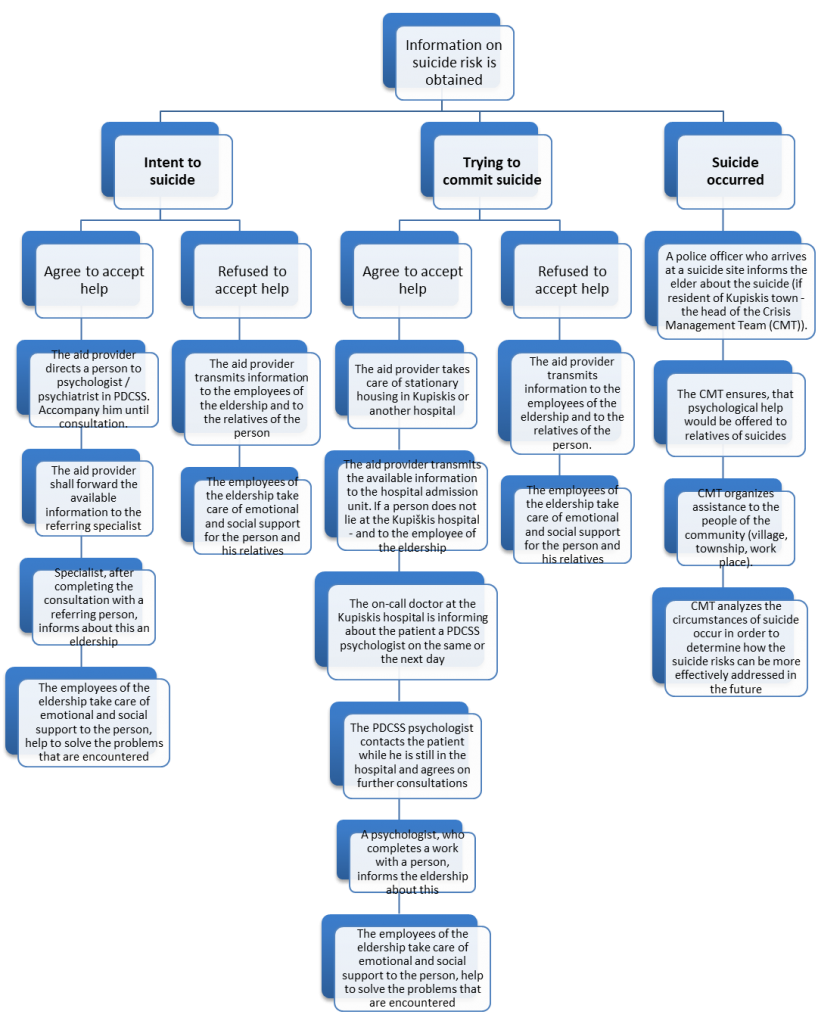Training plan for Global Grants
Grant number: 1743565
| What is the training topic?
|
Training of members (“gatekeepers“) of selected target groups in Municipalities |
| What are the objectives of the training? Provide the curriculum.
|
The training is intended to enable specialists to cooperate effectively in providing quality care for people in suicide crisis and implement suicide prevention activities in the Municipality. The goal of the training is to give necessary knowledge and competences for such activities. provide theoretical knowledge and practical skills that would help to identify, assess and respond to suicide risk. The training consists of 2 parts: general knowledge and competences for suicide prevention and specialized knowledge and competences, related to the role that specialists play in providing assistance (whether they are medical specialists, policemen, teachers, social workers etc.).
Program: 1. Relevance and purpose of suicide prevention. Myths and facts about suicide. 2. Identification and assessment of suicide risk: theory and practice. 3. Management of suicide risk. Responding after attempted suicide or suicide. 4. Specialist’s support network for providing assistance for persons with suicidal intention, those who attempted suicide and suicide survivors. 5. Summary and self-evaluation. |
| What activities will be done to support the training?
|
1. Providing the theoretical knowledge. 2. Applying theoretical knowledge to solve practical situations. 3. Discussing and adjusting of the suicide prevention program to the Municipality. |
| What is the length of the training? How often will the training be offered?
|
Initial training continues for 8 acad.hr. for one group of specialists (in the group of 30-35 people).
During the first year of the project, these trainings will take place in all the participating Municipalities, and in one Municipality specialists will be trained for not longer than 4 months. |
| Who is conducting the training? What are the trainer’s qualifications?
|
Psychologists with European qualification standard (EuroPsy),
participating in the implementation of a system for responding to suicide risk in at least one Municipality. |
| Who is receiving the training? How many men? How many women?
|
Training of selected target groups (mental health specialists, social care workers, policemen, emergency officers, firefighters, community leaders, school staff, church representatives).
On average, 200 specialists in each Municipality participate in the training (6 groups in each 11 Municipality, 66 in total, 30 – 35 people in one group). The number of men and women will depend on peculiarities of the specific staff of each of the Municipality.
|
| What are the expected outcomes of the training?
|
After training, specialists will be able to identify suicide risk signs; they will be able to effectively respond to suicide risk signs, will know where to direct the client for further help. Further, the specialist’s support network will be created. |
| How will participants demonstrate their new skills and knowledge?
|
Participants will apply their knowledge in their daily work by recognizing and responding to the suicide risk; also, they will be able to communicate their knowledge to local communities. |
| How will this training be evaluated?
|
During the second year of the project implementation, the effectiveness of the training will be assessed. Also, statistical information (e.g., increased the number of clients in suicide risk receiving assistance) will be collected and analyzed.
Participants of the training will receive qualification certificates. |
| Will there be follow-up training, communication, or observation of participants?
|
During the second year of the project, supervisions is planned for these specialists. Later, from the financial resources of the Municipalities or from other projects, specialist training will be provided on demand (e.g., responding to depressed clients, communication with intoxicated clients, etc.). |
| Is this new training as a result of the grant or an ongoing training? If the latter, will this training be offered to new participants? Please provide a brief explanation. | The training program has already been applied in other Municipalities, but the novelty of this project is that for the first time in Lithuania 11 Municipalities will participate simultaneously in the implementation of suicide prevention: the specialists will be merged into a common support network, where they will have the opportunity to share their experience and search for problem solving opportunities. Also new is the fact that the Rotary club member, while being a member of the municipal Psychological Crisis Management Group, will have the opportunity to make suggestions to increase the effectiveness of suicide prevention. Training be offered to new participants as continuity of the project. |
Kupiškis algorithm
An algorithm of response to suicide risk in Kupiškis district
The aid provider – an employee of the local eldership, an ambulance doctor, parish inspector (police officer), a medical worker of the eldership, a chairman of the commune.
An employee of the eldership – elder, a social worker at the Kupiškis social services center and at eldership.
Failure to any part of the algorithm inform the Head of the Suicide Prevention Team Valija Šap, phone 8 699 25969.

Notes:
1. If a resident, because of his intention/ attemption to suicide, himself applies to a treatment institution of another municipality district for in-patient treatment, then his family doctor shall take care of the further assistance after treatment.
2. All aid providers are guided by the Law on the Legal Protection of Personal Data of the Republic of Lithuania and other legal acts of the Republic of Lithuania regulating the legal protection of personal data and may only disclose or transfer personal data to entities that are entitled to receive them in accordance with the procedure established by law. Aid providers are committed to share information strictly within the network, protect the confidentiality of information, and when ending the employment relationship or switching from another position to notify the program manager of any circumstances that may endanger the security of the data.